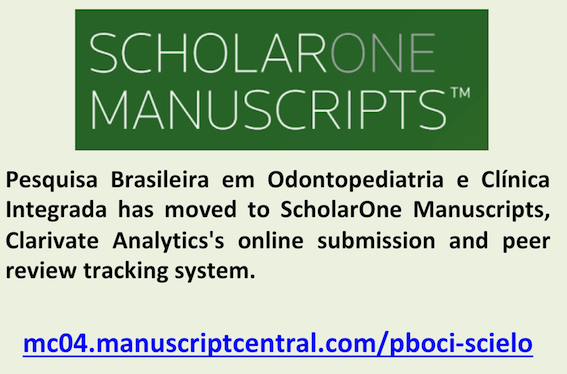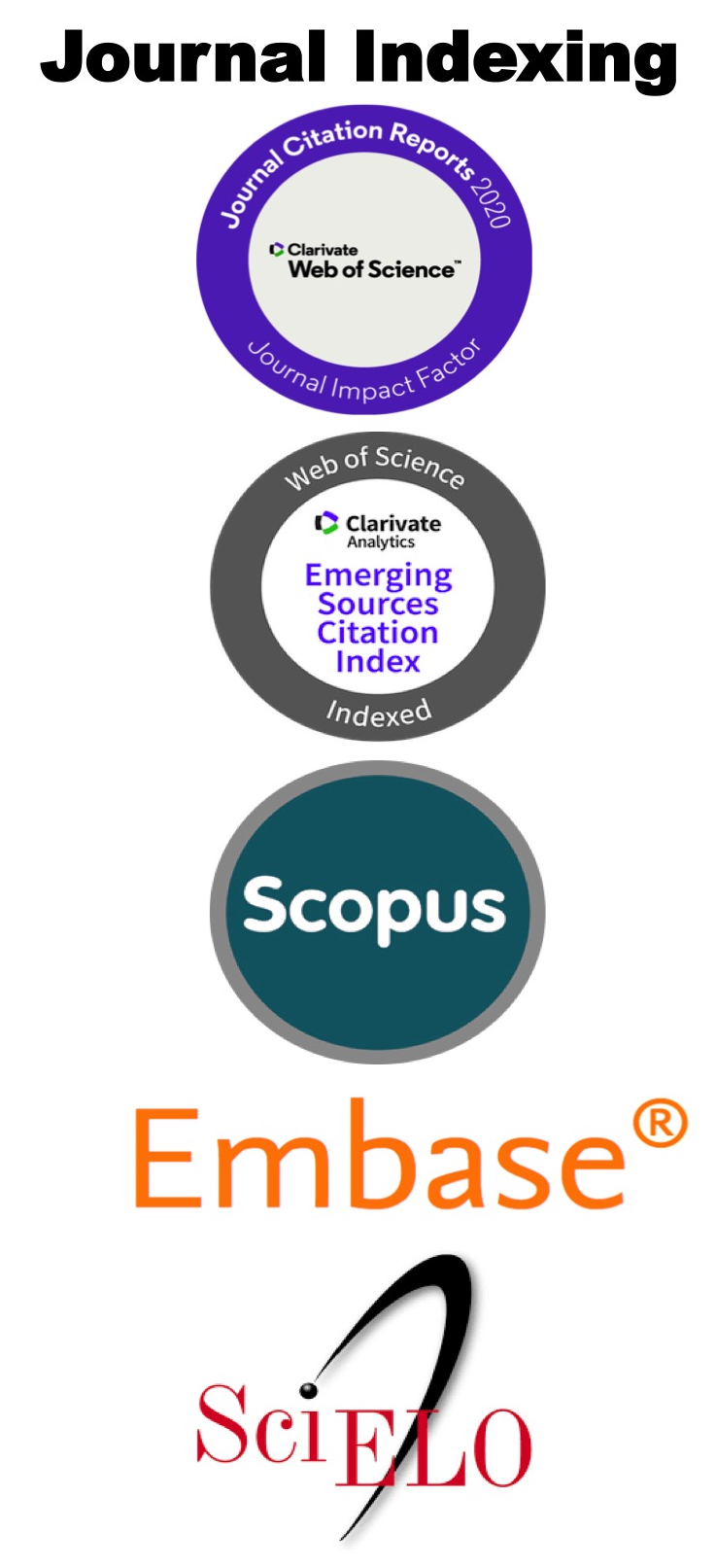Phonetic Alterations Caused by Different Lingual Appliances
Keywords:
Orthodontics, Phonetics, Orthodontic Appliances, Orthodontic BracketsAbstract
Objective: To evaluate the differences in phonetic alterations caused by three different lingual appliances, all bonded in sequence on the same patients. Material and Methods: Lingual brackets (STb, Incognito and Harmony) were bonded from 1.3 to 2.3 with a 0.013 CuNiTi archwire. The text was formulated to evaluate the phonetic variations in a controlled context (logatomi) and more casual sentences. The recording of the text was performed at time t0 (before positioning the brackets), t1 (after positioning the brackets) and t2 (60 minutes after positioning the brackets). An ANOVA-type analysis was performed. Results: A significant correlation was confirmed between the effects of all the linguistic methods used compared to the absence of the same. The most influenced acoustic variables were the center of gravity of the acoustic spectrum of the analyzed sounds (CoG) and the number of zero crossings of the instantaneous amplitude curve of the considered signal. Conclusion: The effects deriving from the positioning of the various brackets were relatively contained: in some cases, for some subjects, for some consonants and in specific contexts, some brackets may occasionally be less invasive than others. However, no lingual system was systematically better than others regarding phonetic alterations.
References
Lopez MA, Andreasi Bassi M, Confalone L, Gaudio RM, Lombardo L, Lauritano D. The influence of conical plus octagonal internal connection on implant survival and success rate: a retrospective study of 66 fixtures. J Biol Regul Homeost Agents 2016; 30(2 Suppl 1):49-54.
Lopez MA, Andreasi Bassi M, Confalone L, Gaudio RM, Lombardo L, Lauritano D. Retrospective study on bone-level and soft-tissue-level cylindrical implants. J Biol Regul Homeost Agents 2016; 30(2 Suppl 1):43-8.
Lopez MA, Andreasi Bassi M, Confalone L, Gaudio RM, Lombardo L, Lauritano D. Clinical outcome of 215 transmucosal implants with a conical connection: a retrospective study after 5-year follow-up. J Biol Regul Homeost Agents 2016; 30(2 Suppl 1):55-60.
Arreghini A, Trigila S, Lombardo L, Siciliani G. Objective assessment of compliance with intra- and extraoral removable appliances. Angle Orthod 2017; 87(1):88-95. https://doi.org/10.2319/020616-104.1
Lombardo L, Scuzzo G, Arreghini A, Gorgun O, Ortan YO, Siciliani G. 3D FEM comparison of lingual and labial orthodontics in en masse retraction. Prog Orthod 2014; 15(1):38. https://doi.org/10.1186/s40510-014-0038-9
Lombardo L, Stefanoni F, Mollica F, Laura A, Scuzzo G, Siciliani G. Three-dimensional finite-element analysis of a central lower incisor under labial and lingual loads. Prog Orthod 2012; 13(2):154-63. https://doi.org/10.1016/j.pio.2011.10.005
Perrini F, Lombardo L, Arreghini A, Medori S, Siciliani G. Caries prevention during orthodontic treatment: In-vivo assessment of high-fluoride varnish to prevent white spot lesions. Am J Orthod Dentofacial Orthop 2016; 149(2):238-43. https://doi.org/10.1016/j.ajodo.2015.07.039
Pisani L, Bonaccorso L, Fastuca R, Spena R, Lombardo L, Caprioglio A. Systematic review for orthodontic and orthopedic treatments for anterior open bite in the mixed dentition. Prog Orthod 2016; 17(1):28. https://doi.org/10.1186/s40510-016-0142-0
Arreghini A, Lombardo L, Mollica F, Siciliani G. Torque expression capacity of 0.018 and 0.022 bracket slots by changing archwire material and cross section. Prog Orthod 2014; 15(1):53. https://doi.org/10.1186/s40510-014-0053-x
Di Fazio D, Lombardo L, Gracco A, D'Amico P, Siciliani G. Lip pressure at rest and during function in 2 groups of patients with different occlusions. Am J Orthod Dentofacial Orthop 2011; 139(1):e1-6. https://doi.org/10.1016/j.ajodo.2010.02.030
Manfredini D, Stellini E, Gracco A, Lombardo L, Nardini LG, Siciliani G. Orthodontics is temporomandibular disorder-neutral. Angle Orthod 2016; 86(4):649-54. https://doi.org/10.2319/051015-318.1
Fujita K. New orthodontic treatment with lingual bracket mushroom arch wire appliance. Am J Orthod 1979; 76(6):657-75. https://doi.org/10.1016/0002-9416(79)90211-2
Hohoff A, Stamm T, Goder G, Sauerland C, Ehmer U, Seifert E. Comparison of 3 bonded lingual appliances by auditive analysis and subjective assessment. Am J Orthod Dentofacial Orthop 2003; 124(6):737-45. https://doi.org/10.1016/j.ajodo.2003.08.022
Stamm T, Hohoff A, Ehmer U. A subjective comparison of two lingual bracket systems. Eur J Orthod 2005; 27(4):420-6. https://doi.org/10.1093/ejo/cji034
Wiechmann D, Gerss J, Stamm T, Hohoff A. Prediction of oral discomfort and dysfunction in lingual orthodontics: a preliminary report. Am J Orthod Dentofacial Orthop 2008; 133(3):359-64; quiz 476.e1. https://doi.org/10.1016/j.ajodo.2006.03.045.
Khattab TZ, Farah H, Al-Sabbagh R, Hajeer MY, Haj-Hamed Y. Speech performance and oral impairments with lingual and labial orthodontic appliances in the first stage of fixed treatment. Angle Orthod 2013; 83(3):519-26. https://doi.org/10.2319/073112-619.1
Slater RD. Speech and discomfort during lingual orthodontic treatment. J Orthod 2013; 40(Suppl 1):S34-S37. https://doi.org/10.1179/1465313313Y.0000000059
Komori A, Takemoto K, Shimoda T, Miyashita W, Scuzzo G. Precise direct lingual bonding with the KommonBase. J Clin Orthod 2013; 47(1):42-9.
The R Foundation. R-Language - The R Project for Statistical Computing. 2015. Available from: htpp://www.r-project.org. [Accessed on January 12, 2021].
Bates D, Machler M, Bolker B, Walker S. Fitting linear mixed-effects models using Ime4. J Stat Softw 2015; 67(1):1-48.
Chambers JM, Freeny A, Heiberger RM. Analysis of Variance: Designed Experiments. In: Chambers JM, Hastie TJ. Statistical Models in S. Michigan: Wadsworth & Brooks/Cole Advanced Books & Software; 1992. 608p.
Knösel M, Klang E, Helms HJ, Wiechmann D. Occurrence and severity of enamel decalcification adjacent to bracket bases and sub-bracket lesions during orthodontic treatment with two different lingual appliances. Eur J Orthod 2016; 38(5):485-92. https://doi.org/10.1093/ejo/cjv069
Sfondrini MF, Debiaggi M, Zara F, Brerra R, Comelli M, Bianchi M, et al. Influence of lingual bracket position on microbial and periodontal parameters in vivo. J Appl Oral Sci 2012; 20(3):357-61. https://doi.org/10.1590/s1678-77572012000300011
Hohoff A, Fillion D, Stamm T, Goder G, Sauerland C, Ehmer U. Oral comfort, function and hygiene in patients with lingual brackets. A prospective longitudinal study. J Orofac Orthop 2003; 64(5):359-71. https://doi.org/10.1007/s00056-003-0307-6
Doshi UH, Bhad-Patil WA. Speech defect and orthodontics: a contemporary review. Orthodontics 2011; 12(4):340-53.
Paley JS, Cisneros GJ, Nicolay OF, LeBlanc EM. Effects of fixed labial orthodontic appliances on speech sound production. Angle Orthod 2016; 86(3):462-7. https://doi.org/10.2319/052415-351.1
Downloads
Published
How to Cite
Issue
Section
License
Copyright (c) 2021 Pesquisa Brasileira em Odontopediatria e Clínica Integrada

This work is licensed under a Creative Commons Attribution-NonCommercial 4.0 International License.



